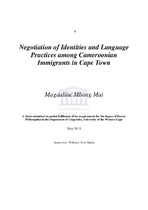| dc.description.abstract | This thesis is an exploration of the historical, socio-cultural, economic, and political settings in which identities are negotiated and performed among Cameroonian immigrants in Cape Town. Focusing on language as localized practices and different interaction regimes, the thesis investigates how Cameroonian immigrants maintain and reconfigure the Anglophone/Francophone identity options in novel and hybrid ways. In addition, the study examines how ideologies favouring different languages are reproduced and challenged in translocal and transnational discourses. Guided by the poststructuralist theories the thesis explores the stance that reality is socially constructed, based on symbolic and material structural limitations that are challenged and maintained in interaction. That is, whatever we do or believe in, is supported by some historical or cultural frames of meanings in our lived world, which often gives room to some manoeuvre to do things in a new way. The study adopts a multiplex interpretive approach to data collection. This entails a qualitative sociolinguistic approach where interviews, discussion and observations at different socio-economic places namely; meetings, workplaces, homes, restaurants, drinking spots and many sites from all over Cape Town, were explored. The study suggests that Cameroonians have a multiplicity of identity options, which are manifested and negotiated performatively through language, dress code, song, food, business, and other practices that comprise their lifestyles. These identities are translocal and transnational in nature, and tend to blend South African, Cameroonian, and even American traits. It is also suggests that the different identity options which they manifest are highly mobile, enabling Cameroonians to fit into South African social structures as well as the Cameroonian ways of doing things. Additionally, the multiplicity of identities that Cameroonians manifest, blur the fault-line between Anglophone/Francophone identities. It is evident from the study that hybridity and the reconstruction practices are not only confined to languages. Hybridity also extends to discourse orders especially in terms of how meetings are conducted. The Cameroonian meetings captured through the activities of Mifi Association and CANOWACAT are characterised by ‘disorder of discourse’ in which both formal and informal versions of English and French are used separately or as amalgams alongside CPE and their national languages, not only in side talks, but also when contributing to the meeting proceedings. Ultimately, the study concludes that Cameroonians are social actors making up an indispensable part of the social interaction in the Cape Town Diaspora. Just as they influence the languages, the entrepreneurial practices, and spaces in which they interact, the Cameroonian immigrants are also transformed. The major contribution of the study is that it adds to the recent debates about the nature of multilingualism and identities in late modern society. It emphasises that languages and identities are fluid, complex, and unstable. The distinction or boundaries between the various languages in multilingual practices are also not as clear-cut. This leads to a reframing of voice and actor hood as meaning is constructed across translocal and transnational contexts and domains in a networked world transformed by the mobility of endless flows of information, goods, ideas, and people. Thus, the study contributes to those arguing for a paradigm shift in sociolinguistic theory in which language is not a property of groups, nor is it an autonomous and bounded system fixed in time and space. Thus, identities, languages and the spaces of interaction are not fixed systems; identities, languages, and spaces are dynamic and in a state of flux. This in turn questions the notions of multilingualism and language itself, as well as the veracity of concepts such as code-switching, speech community, language variation, as the search for a sociolinguistic framework that can deal with phenomena predicated by motion, instability, and uncertainty, continues. | en_US |

